Tune in every second day this week to see how we spent our family holiday in Central/Northern Greece.
Summertime means holidays by the beach - but not necessarily for islanders like ourselves. As Cretans, living close to the sea near some of the best beaches* on Earth, we like to take our summer holidays in cooler climates and higher terrain. This year's summer holiday took us to Central Greece: the first part of the trip began in Northern Pilio**.
Summertime means holidays by the beach - but not necessarily for islanders like ourselves. As Cretans, living close to the sea near some of the best beaches* on Earth, we like to take our summer holidays in cooler climates and higher terrain. This year's summer holiday took us to Central Greece: the first part of the trip began in Northern Pilio**.
We had briefly visited Pilio on a previous road trip, but did not have enough time to explore it properly. The Pilio peninsula is noted for its ski resorts in the winter and beaches* in the summer. This mountainous region is heavily forested, and the architecture of Northern Pilio (unlike the southern part of the peninsula) still preserves a traditional building style: stone-built houses with wooden frames and slate-tiled roofs. Many villages in Northern Pilio are perched on a steep incline: a main road runs through each village, but the houses and shops above and below that point are usually only accessible from the stone-built pathways (kalderimia - καλντερίμια) - some resembling steps, others footpaths built on an incline - which have become shiny and slippery from over-use. The main crop grown in the area is apples. Logging also forms an important industry in Pilio given its dense forests, but the main industry of the area is now tourism-related in the form of hotels, restaurants, cafes and locally produced packaged fruits. This is the reason why meat raising and crop growing went into serious decline in the area, and have now virtually been eradicated: people prefer to make money in more easy ways. Tourism brought about an unexpected prosperity to the residents of Pilio.
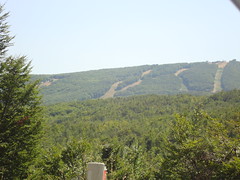
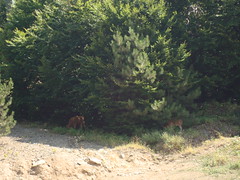
Above: The Pilio ski resort is home to a number of animals, both wild and domesticated; the local breed of little brown cow can be seen here, living in forest where wolves, bears and wild boars still roam. Below: Father and son in the logging business - the forestry service marks the trees they are allowed to chop (basically, to keep the forest manageable) and they use no less than eight horses (and four labourers, mainly immigrants) to carry the chopped logs up to the road to be loaded onto a truck.
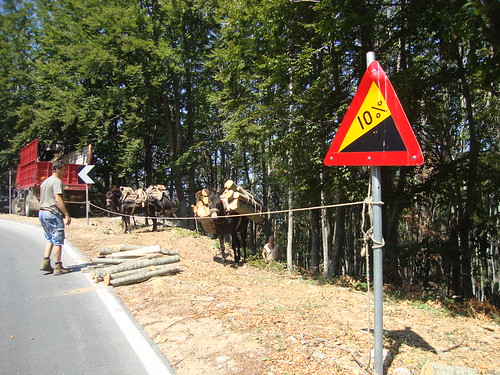


Above: The Pilio ski resort is home to a number of animals, both wild and domesticated; the local breed of little brown cow can be seen here, living in forest where wolves, bears and wild boars still roam. Below: Father and son in the logging business - the forestry service marks the trees they are allowed to chop (basically, to keep the forest manageable) and they use no less than eight horses (and four labourers, mainly immigrants) to carry the chopped logs up to the road to be loaded onto a truck.

Not only does Pilio's tourism sector work all year round (unlike Crete's), but Pilio's tourism, with its variety of activities available in both the summer* and winter seasons, is not directed towards foreigners (like Crete's): it is predominantly domestic, possibly due to a lack of infrastructure - foreign tourists like easily accessible roads and large hotel complexes with swimming pools. The hotels/rooms are mainly composed of small units due to the terrain, which makes the area rather inaccessible without wheels or good walking shoes. To see as much of Pilio as possible on a single visit, you need to drive a car on steep narrow roads with many bends. It's not easy to stay in one place and drive around the area - you need to move on from one hotel to the other, like we did. Unlike Crete, most of the hotels in Pilio are open throughout the year. For many years, Pilio used to be the place to go in the winter for well-heeled Athenians, who would block the narrow roads with their huge utes (the ones they can no longer afford to drive due to increased expenses, taxes and petrol costs), especially at Christmastime, conjuring images of snow and log fires. But domestic tourism is in serious decline: one of the first things you reduce or cut out altogether during an economic crisis is holidays.
An apple orchard in the village of Zagora, known for its apple cultivation, especially the Zagorin label: no one will reprimand you (at least, in Crete, I am sure of this) if you pick a (ie one) piece of fruit off a tree to try it; good walking shoes are recommended at all times in Pilio - the stone pathways (kalderimia) running through the villages are slippery. A regular rail service used to run from the west coast of Pilio through the more mountainous villages right up to the village of Milies, but this has now been discontinued.


On our first night, we stayed in a hotel in Tsagarada. The owner's 14-year-old son gave us what looked like a small but comfortable room (one double-bed and two sofas that open out to become beds) quoting 60 euro as the price for the one night we were to stay there. I asked to pay up immediately so that we would be ready to leave the next day. He then quoted a price of 65 euro per night if we wanted breakfast. OK, I thought, why not, so I paid 65 euro. The next morning, we called into the reception area for breakfast. This time, the owner was there. He told us we had only paid for the room (father and son obviously have a communication problem). When we (meaning both me and my husband) insisted that this was not the case, he said: "OK, I'll serve you two breakfasts." When I complained, he started ranting: "Do you know how much money I've lost over your room charge? That room is normally rented out at 75 euro a night without breakfast!" That really wasn't my problem, was it? Nor was it my problem that the rooms were only a year old and that the owner had opened them during the economic crisis, so he probably still had debts to pay, or that he had invested a lot of time, effort and money in decorating them tastefully, only to rent them out cheaply to impoverished tourists. His actions go against what is understood as filoxenia (Greek hospitality); taking food out of a guest's mouth to save on expenses is a shameful act. The owner's attitude really isn't going to help Greece in the long run, is it?
Lambinou beach (left) is a very small pebbly cove formed by a river that pours into the sea at this point; Horefto beach (right) was also very pebbly, whose depth dives suddenly after only a few steps in the water. By enlarging the photo, you can see the village of Pouri perched on the mountainside. Springs with refreshingly cold water can be found along all the roads - no need to buy it, just carry a bottle and fill it up as you travel.


On our second night in Pilio, we ate at a seaside restaurant in the coastal village of Horefto, the only place where we went swimming during our road trip. At some point, we had misplaced a pouch bag, and tried to contact the restaurant to see if they had found it on their premises. I took out the receipt I picked up from the restaurant (which of course I had to ask for, otherwise I wouldn't have got it - that's not helping Greece in the long run, is it?) which stated what looked like the name of the owner of the restaurant (a certain Petros Liantis), the business's tax identity number (what is known in Greece as ΑΦΜ), the date and the cost of the transaction. It did not have a contact phone number, so I called a directory service - to be exact two of them; neither could help me: "I'm sorry madam, but this name or restaurant does not exist for the area you have quoted." The receipt was a fake; in other words, this was a clear case of tax evasion. How long has this been going on? Who is allowing this to happen? That's not helping Greece in the long run, is it?
PS: We stayed at Hayiati Hotel at Horefto, which offered us the same price as the young boy offered us at Villa Nicolaou in Tsagarada for both room and breakfast (we chose a no-breakfast option: only 45 euro for our sole night there).
At Horefto, we enjoyed a variety of home-style meals, typical of the area: Pilio aubergines (aubergine slices baked with white cheese and tomato), kleftiko (lamb and herbs/vegetables cooked in parchment), lemon-flavoured braised pork and a pot of yiouvetsi (orzo rice is called 'manestra' here: in Crete, it's called 'kritharaki'). The little bottles contain the local version of firewater - in Hania we call it tsikoudia, up north it's called tsipouro, and it goes by the generic name of 'raki'. Regional variations taste different. Typical Pilio architecture: slate tiled roof and woodwork; older houses were made of stone and nearly all the traditional homes have characteristic chimneys with a pointy top. This style is unknown in Crete and it would be difficult to find someone here that knows this trade.


On our third night, we decided to stay in Makrinitsa, in the same rooms that we had stayed in on our last visit to Pelio, which were located just a few metres away from the main square of the village, making them a peaceful place for a quiet getaway; to our dismay, we found it closed. The owners told us that they could not find enough staff to run it (or maybe there is an economic crisis...), but they did have rooms available elsewhere in the village, so we stayed there. We wanted to stay the night at Makrinitsa so that we could have a long leisurely breakfast while enjoying one of the most breathtaking views in the area, at the Pantheon cafe, the focal point of Makrinitsa's main square. Well... let's just say they don't serve breakfast any more. When we asked what was on the menu, the waiter told us that they had only hortopita, something like spinach pie - it really doesn't go pair well with a coffee in the morning! "Do you have any bread?" I asked. "No." "No honey and butter, either?" I pleaded, remembering the chunks of fresh yellow butter and the little honey pots from our previous visit. "No." We settled on a couple of tiropites (cheese pies) from the local bakery instead...
PS: Theofilos Arhontiko offered us two double rooms for 70 euro (no breakfast), in a renovated character home exuding an air of the area's past affluence. Despite the steps (no lift) and lack of car parking facilities (Makrinitsa is a vehicle-free zone), Theofilos Arhontiko remains one of the most memorable and inspiring hotels I have ever stayed in.
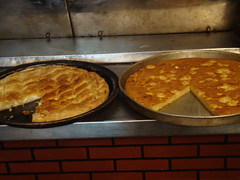
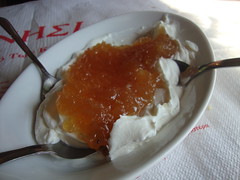
Tiropita (cheese pie) and tiropsomo (cheese bread) - the latter is a Pilio speciality; the apple spoon sweet tasted like a mixture of quince and honey - it was spooned over yoghurt and served at the end of the meal. The views from Theofilos Arhontiko were quite stunning; traditonal architecture, city and mountain, sea and islands all rolled into one. Makrinitsa is, by far, the most picturesque village in Pilio.




PS: Theofilos Arhontiko offered us two double rooms for 70 euro (no breakfast), in a renovated character home exuding an air of the area's past affluence. Despite the steps (no lift) and lack of car parking facilities (Makrinitsa is a vehicle-free zone), Theofilos Arhontiko remains one of the most memorable and inspiring hotels I have ever stayed in.


Tiropita (cheese pie) and tiropsomo (cheese bread) - the latter is a Pilio speciality; the apple spoon sweet tasted like a mixture of quince and honey - it was spooned over yoghurt and served at the end of the meal. The views from Theofilos Arhontiko were quite stunning; traditonal architecture, city and mountain, sea and islands all rolled into one. Makrinitsa is, by far, the most picturesque village in Pilio.




*** *** ***
Bullshit artistry and declining professionalism aside, we had a good time in Pilio. We toured a part of the country that was new to us, and enjoyed the dense look of the forested mountains of the area. The best time to visit Northern Pilio would be in cooler weather, when you can take walks in the forests - there are very well sign-posted nature trails covering the mountain and forested regions. My main grievance with Pilio is the complete lack of professionalism, integrity
and recognition of the Greek reality shown by some businesspeople in
the area. No wonder there were more 'For Sale' signs (for land sections, not houses) in the area than I saw elsewhere on our road trip - certainly many more such signs than I see on our roads here in Crete (this suggests that people seems to be wanting to get rid of property because it's less useful than money these days.) The Greeks themselves make jokes about how they can't or won't or simply refuse to change; maybe that's why they sometimes get what they deserve. My experiences above should be used as advice on how to avoid
such situations, rather than as guidelines on what actually happens in Greece. I know of peole who often holiday in Pilio and they know exactly how to avoid these bad bits (always rely on good sources; it pays to ask). But TripAdvisor has been informed of some of these shenanigans and that certainly won't help Greece in the long run, will it?
Baked beans and sausage at the Hania - Greek cuisine (gigandes) is very recognisable wherever you travel in Greece; the spoon sweets here are made from all sorts of fruit and vegetables, including carrot, tomato, quince and watermelon rind. Below: an architectural detail of the (renovated) roof and chimney of a typical house in Northern Pilio.


*It is not an overstatement to claim that Crete has some of the best beaches in the world - probably the best in Europe.
**You will also find the area referred to as Pelion or Pelio - I prefer to keep things simple.
©All Rights Reserved/Organically cooked. No part of this blog may be
reproduced and/or copied by any means without prior consent from Maria
Verivaki.
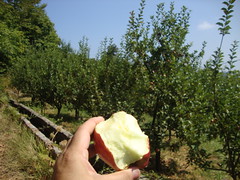

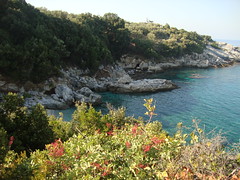

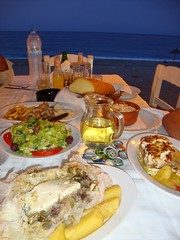

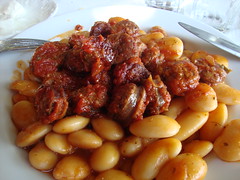
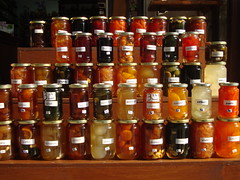
Simply beautifully captured shots...lovely place to visit!
ReplyDeletea commentator who wishes that his identity remain anonymous writes:
ReplyDeleteWell, you got the bullshit artistry right in a sense but things were quite promising in the late '70's for Pelion. Probably it was the first region that traditional houses were renovated by EOT and became the haunt of leftist artists and "stars" like Karezi and Kazakos, Savvopoulos, Tsanaklidou and minor ones that attracted the Athenian crowds but it never became Arachova, too far away from Athens. The Germans that used to drive down to the area in those early years with their VW's were nature lovers, ecologists and the likes. That left an anglosaxon community of 5,000 strong in Pelion which does its best to instill their lifestyle and gives a cosmopolitan air to the region. In the '90s the Athenians turned their interest towards Parnassos for skiing and the islands for their summer holidays, the Thessalonicians preferred Chalkidiki and the Germans turned to package holidays. So the original momentum of develpoment was dampened, much to the place's advantage if you ask me. And Volos, a traditionally left wing town, saw a rise in conservatism with the church playing a predominant role and gradually became more introvert with small town politics rising and favouring people like the small hotel owners in the area. Christodoulos came from Volos. The building boom with the abundant offer of mortgages and loans gave a temporary boost to their economy with new boutique hotels and overpriced holiday homes. But the dream of a quick fortune is now over and the loan has to be paid back, hence the bitterness. I myself have noted that the quality of food in Pelion has declined in the last decade. Their arrogant and unprofessional attitude and their short-sightdness drove away their chance for Pelion becoming the alternative retreat of Europe. Maybe all is not lost of course and when they are wiser they may get a second opportunity because the mountains, the sea, the villages are all still there.
By the way, regarding the "for sale" signs, this is a much bigger scam from what I read in the internet. In 1985 the local authorities, νομάρχες, were given the authority to determine the village boundaries except for the cases where the villages were under a protection status. Of course the nomarches were delighted and went beyond their authority. As a result the Pelion villages which most of them are protected, quadrupled in size and the business of selling olive orchards for pricey building land started. A couple of years ago though when a big hotel development and holiday homes by the sea was under way of starting construction, a neighbouring lawyer that didn't like his peace being disturbed, took them to courts that their building permit was illegal. Last year the court decided that he was right and as a result a large of houses and businesses built after 1985 within the extended boundaries are now probably illegal. The new building permits are now issued not based on the extended village boundaries but every case is individually considered on how close it is to the original core of the village. Maybe it is still the best kept secret now in Pelion but the village boundaries must be reset to their original pre 1985 position because in the end you can't have it all, character and uncontrolled development. As I understand from your observation land owners are now trying to push their land to unsuspected outsiders before it looses its value. They are trying to do this in other parts of the country too in protected villages but the new boundaries are still to get their final review and maybe if the Pelion scam comes out in the open it will stop it from happening elsewhere
it feels good to be validated, epecially since i was quite unsure about how people would react to this post - i am simply describing what i saw and expressing my feelings about it; the tax evasion and belief that someone had something valuable to sell (ie pretentious hotel services) got up my nose - and god help me, you should never deny travellers a slice of bread in the morning, especially your own people carting their children with them, helping them to see their beautiful country
ReplyDeleteDreadful treatment from the hotel owner. Sorry to see that some Greeks still have not got the basic notion of service industry: piss off one person, and you lose the potential custom of all the people whom that person tells of your lousy dealings. Still, the place and the food look beautiful.
ReplyDeleteOh Pilio! My relatives - in their 70s and 80s all still think highly of Pilio, but they don't stay too long - just for quick visits. I went once or twice when I lived there in 2004. The apples were tops. That is sad about the fake receipt. It's pretty disappointing and I wonder what it will take for things to shape up. More German nature loving tourists per annon commenter?
ReplyDelete